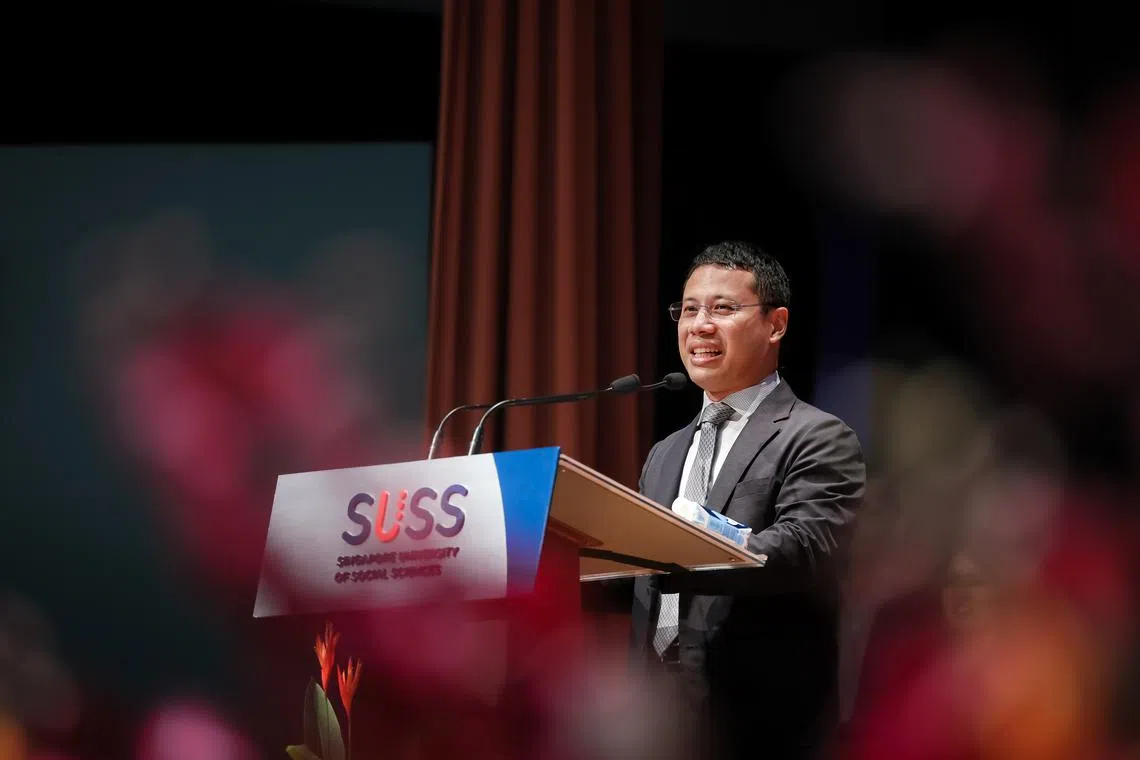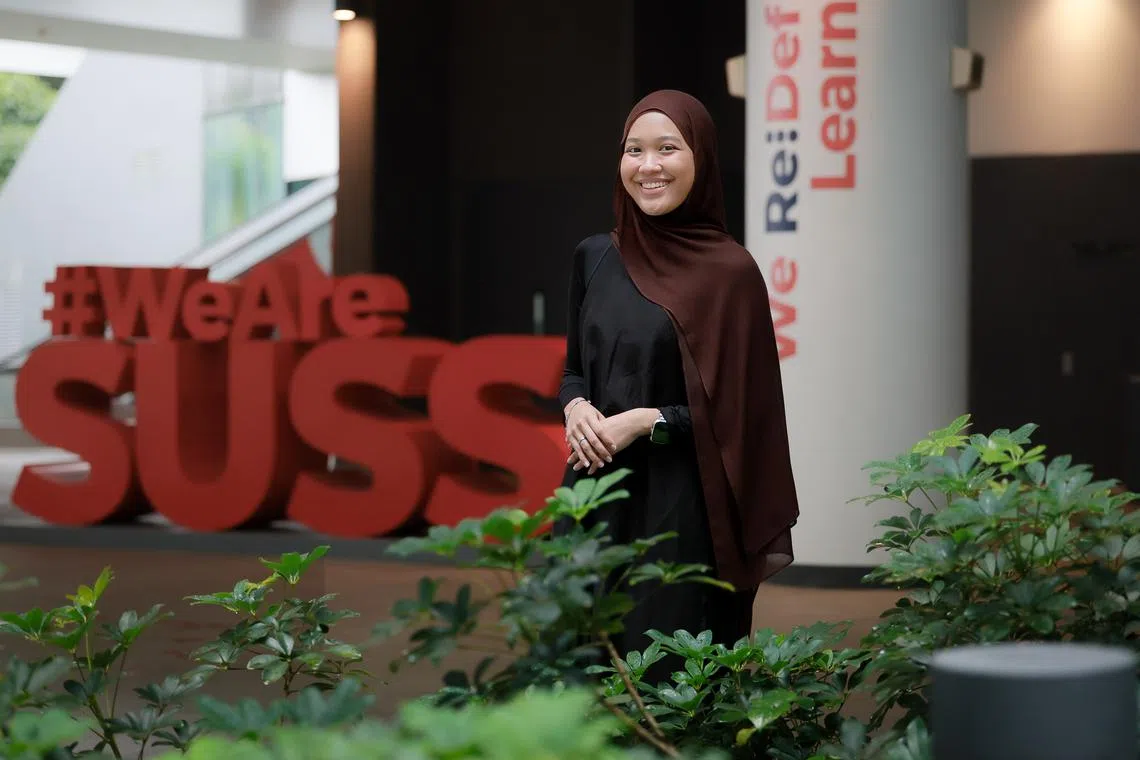SUSS’ new social work school will help strengthen sector to address complex issues: Desmond Lee
Sign up now: Get tips on how to help your child succeed

Education Minister Desmond Lee speaking at the official launch of SUSS' School of Social Work & Social Development at the Clementi campus on Sept 4.
ST PHOTO: GAVIN FOO
SINGAPORE – From growing loneliness to rapid technological disruption, social issues are becoming more complex as society evolves, said Education Minister Desmond Lee on Sept 4.
Challenges resulting from an ageing population, mental health pressures and economic dislocation are deeply intertwined, he said.
“Today’s issues are increasingly complex, and the challenges people face are often manifestations of intractable as well as intertwined problems,” said Mr Lee, who is also Minister-in-charge of Social Services Integration.
He was speaking at the launch of Singapore University of Social Sciences’ (SUSS) new School of Social Work and Social Development at the campus in Clementi.
To address these challenges, social work will need practice partners and people, said Mr Lee, which is why the launch of the new school is more than just the opening of an institution.
“Today marks not just the launch of a new school, but a new chapter in this journey towards building a strong social work sector, in order to lead boldly in the face of complex social challenges and to lay a strong foundation for the future,” he said.
Announced in March, the new school will build on existing programmes and introduce a revamped curriculum to address workforce shortfalls, attrition and burnout in the social work sector.
The curriculum will allow students to specialise in various areas like the protection of vulnerable individuals, eldercare, disability services, family social work, and juvenile justice and correctional settings.
It will also include graduate-level courses to help social workers grow in their careers, and courses for those who want to switch to different areas within social work or develop new skills such as counselling, psychology, management or digital skills.
Students will also get enhanced practicum experience – a short-term supervised training stint – with industry partners in their chosen field.
Social work requires a strong understanding of the ground, said Mr Lee, and with the new school anchoring education in real-world contexts, practitioners will be better equipped to meet diverse client needs in different settings.
To this end, the Ministry of Social and Family Development (MSF) has partnered SUSS, allowing undergraduates focusing on protection, for instance, to serve their practicum with the ministry’s protective service, said Mr Lee.
Future social workers also must be able to understand multifaceted issues to deliver effective care, he said, as the boundaries between health, education, housing and financial well-being are increasingly blurred, especially for complex families.
Mr Lee added that robust, evidence-based research will also be critical to informing practice.
Social work of the future requires strong partnership and collaboration, he said. “Good solutions rarely emerge in isolation but are the result of the community, private sector and Government working hand in hand.”
Mr Lee noted that the new school will work closely with partners to build strong networks to address challenges.
One example is its collaboration with volunteer welfare organisation Lions Befrienders Service Association and SUSS’ Behavioural Insights Centre of Excellence to study senior volunteerism.
The findings are already being translated into recommendations to strengthen volunteerism and the role of Active Ageing Centres in Singapore, said Mr Lee.
At the same time, nurturing the next generation of social workers while also helping current practitioners deepen their skills is an important role that the new school will play, he said.
The National Council of Social Service, SUSS and Workforce Singapore have a work-study career conversion programme that trains mid-career individuals to become qualified social workers, he added.
SUSS and MSF also signed an agreement to roll out continuing education and training programmes for MSF officers, starting with those in Social Service Offices, said Mr Lee. These will cover areas ranging from reflective practice and cultural competencies to family intervention and social welfare policy, with the first run beginning in September.
SUSS president Tan Tai Yong, who also spoke at the launch, said the university will establish its first professorship in social work.
Supported by a $2 million gift from the estate of the late Madam Siow Fung Wai Ying, the professorship will support applied research in areas like improving community mental health, easing caregiving burdens and helping youth connect online.
Mr Lee said the school is already exploring leadership forums and curated programmes with partners to nurture leaders who have bold ideas, embrace innovation and harness technology for good.
The school will continue to offer its existing three part-time social work programmes – the Bachelor of Social Work, Graduate Diploma in Social Work and Master of Social Work – and the full-time Bachelor of Social Work programme.
The part-time programmes will have two admission intakes a year – in January and July – and the full-time programme one intake in August.
At the post-graduate level, two specialised tracks will be offered – policy and management, and professional clinical practice – to develop thought and practice leaders in the sector.
Currently, SUSS admits 250 to 300 students into its undergraduate and graduate programmes in social work, but the school hopes to expand the enrolment to 400 students, said the dean of the new school, Associate Professor Vincent Ng.
Prof Ng said emerging challenges in social work are multifaceted, and the new curriculum can help to address them.
The curriculum is designed to provide systematic and in-depth training, with placements in line with students’ chosen areas of focus, he said. Students are also encouraged to take minors in complementary fields like psychology.
“It is important (for our students) to adopt a holistic and, at the same time, an interdisciplinary perspective, and draw from different types of knowledge,” Prof Ng said. Students who do not wish to choose an area of focus immediately can still take a broad range of modules to remain adaptable, he added.
Year 2 social work student Nur Farahiyah Fazli said she hopes to further pursue her interests in helping children, but she also wants to take the opportunity to learn about other potential areas of social work.

Ms Nur Farahiyah Fazli is currently pursuing a Bachelor of Social Work.
ST PHOTO: GAVIN FOO
The 22-year-old is most looking forward to the practicum aspect, where she will venture beyond her earlier interests to explore eldercare and family social work.
“The more I learn about social issues, the more I realise there are many things I can do to help,” she said, noting that the theories and practical skills she has learnt are also applicable for everyday life.
Correction note: In an earlier version of the story, we said that the work-study career conversion programme aimed at training mid-career individuals as qualified social workers is new. Workforce Singapore has clarified that it is not new.



